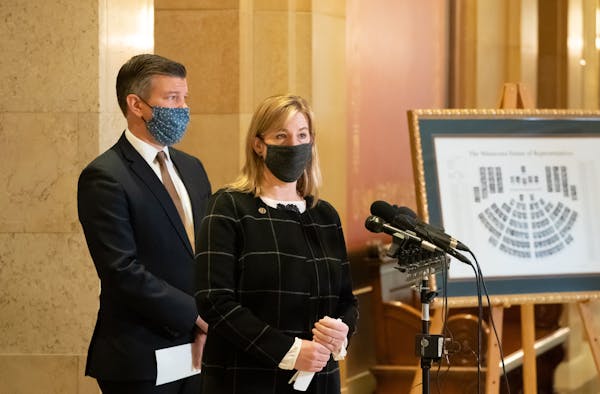The Minnesota House passed a nearly $1.9 billion public works infrastructure package Wednesday that lawmakers and workers in the construction industry heralded as a critical economic stimulus amid the COVID-19 pandemic.
The Senate still needs to vote on the measure and could try to make changes. But getting enough support from House Republicans was widely viewed as the key hurdle for a bill that lawmakers have been debating for more than six months.
House members voted 100-34, with 25 Republicans joining their Democratic colleagues, far surpassing the supermajority needed to approve the bonding bill. If the Senate passes the measure and Gov. Tim Walz signs it into law, it would authorize borrowing for statewide construction projects and potentially create thousands of jobs.
"The most important reason to pass this bill is the jobs that the bonding portion of the bill creates. But every portion of this bill is essential to economic recovery in COVID-19," Democratic House Speaker Melissa Hortman said.
With just a few weeks until Election Day — when every Minnesota House and Senate seat will be on the ballot — partisan politics dominated much of the debate. Amid discussions of the bonding package, lawmakers clashed over mask requirements, the Enbridge Line 3 pipeline, funding for the Minneapolis Police Department and Walz's response to the looting and arson following George Floyd's death.
But the main disagreement in the Legislature's fifth special session of the year came down to the amount of new spending in the bonding bill, given the impending state budget deficit. Minnesota is projected to have a $2.4 billion budget hole in the current two-year budget cycle and a $4.7 billion gap in the two years after that.
"For the love of lutefisk, this is an expensive bill," said Rep. Jim Nash, R-Waconia. "And so many are rushing toward it with open arms, professing their undying love for something that they have no idea how it's going to get paid for."
Besides approving state borrowing for infrastructure, the bill contains a GOP-backed tax cut that would benefit farmers and businesses making equipment purchases.
Lawmakers also merged a supplemental budget proposal with the bonding bill. The additional spending would be used for direct care and treatment services, overtime for corrections workers and public safety funds for the response to unrest around the Twin Cities. The new spending would be offset by a $100 million transfer from the state's reinsurance account and with savings from refinancing bonds and a higher federal reimbursement rate on Medical Assistance.
House GOP Minority Leader Kurt Daudt, R-Crown, raised concerns about the cost of debt service on the bonds and the additional spending. He had previously tied passage of the bonding bill to the expiration of Walz's emergency powers in the pandemic, but has recently dropped that condition.
Daudt on Wednesday proposed using a variety of transfers from other funds, which he said are necessary to pay for the bill. He suggested transferring unused dollars from the COVID-19 Minnesota Fund, the federal coronavirus relief fund and other existing funding sources. He called it a "very reasonable proposal" that does not make cuts to state agencies. But the House voted down his amendment 77-56.
In the past few days, Hortman and Republican Senate Majority Leader Paul Gazelka have been trying to adjust the bonding package to secure Daudt's support. They could not get him on board.
"I completely understand that for a conservative, this is a difficult bill to vote for," Hortman said. She called the measure a compromise, saying it lacks some of the transit projects Democrats wanted, such as light rail and passenger rail. But she said it contains more highway funding and some money for bus rapid transit.
The House bill includes about $1.4 billion in state-backed general obligation bonds. It also has other types of infrastructure funding, such as $100 million in housing bonds and nearly $39 million from the state's general fund — much of it for arts, cultural and Native American facilities.
The bonding bill only addresses a portion of the $5 billion in requests from around the state, said Rep. Mary Murphy, DFL-Hermantown, who has shepherded the bill through the House. But she stressed that it will go a long way toward constructing and repairing water infrastructure, University of Minnesota and Minnesota State campus facilities, roads, bridges and other projects.
There is also funding in the bill to ensure the correctional facilities at Togo and Willow River remain open. The state planned to close the small prisons due to budget constraints.
"Is it a perfect bill? No," said Rep. Dean Urdahl, R-Grove City. But he urged Republicans to support it, saying, "We are obligated to care for the needs of the state of Minnesota."
Former DFL Senate Majority Leader Kari Dziedzic dies of cancer at age 62

How the Star Tribune is covering the 2024 election

Fact check: Walz and Vance made questionable claims during only VP debate

In Tim Walz's home city, opposing groups watch him debate on the national stage

